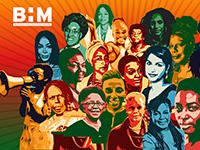 October is Black History Month, an opportunity to celebrate the invaluable contributions of Black people to British society. Surrey Heritage supports this international awareness campaign every year and recognises the need to preserve the history of Black lives in the county, raising awareness of their lived experience through our collections and outreach. This work can also inspire and empower future generations.
October is Black History Month, an opportunity to celebrate the invaluable contributions of Black people to British society. Surrey Heritage supports this international awareness campaign every year and recognises the need to preserve the history of Black lives in the county, raising awareness of their lived experience through our collections and outreach. This work can also inspire and empower future generations.
Our unique archive and library collections reveal local life stories, with context, some of them uncomfortable to read but acknowledging how people of colour were treated in the past. You can access our online resource 'Black History in Surrey' (Exploring Surrey's Past). The Black History Month website features articles and commentary on all areas of research from African and pre-colonial history and slavery, to sporting heroes and inspirational women.
The 2023 Black History Month campaign theme is 'Saluting our Sisters', dedicated to honouring the achievements of Black women who are often forgotten heroines. Former civil servant and author, Cherron Inko-Tariah M.B.E., explains more: 'Black people have always been at the forefront of social justice movements, fighting against oppression and paving the way for change. However, despite their countless contributions to society, the achievements of Black women, in particular, have too often been overlooked or forgotten.' In this Marvel we look at the lives of women whose legacy of freedom and empowerment continues today.
Can you help us?
There is little in our collections that tells of the experience or contributions of Black women in Surrey over the centuries. Even in the last 50 years, such stories are incredibly difficult to secure so if you can help us to develop our collections and expand the dialogue about Black presence in Surrey, either with stories or material, please contact Surrey History Centre.
Ellen Craft (1826 to 1891)
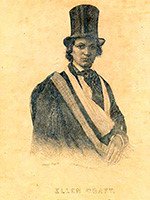 The story of Ellen Craft and her husband William is so extraordinary and inspiring that one wonders why it hasn't been turned into a Hollywood film. Ellen was born in Clinton, Georgia, USA, and was the daughter of an African American enslaved woman and her white owner. According to her testimony Ellen tells us she had a very light complexion and was frequently mistaken for a member of her white 'family'. At the age of 11, she was given away as a wedding gift to a family in Macon, Georgia, and there she met and fell in love with a fellow enslaved worker, William Craft. Permitted to marry but not permitted to cohabit, the Crafts planned to escape and in December 1848 they headed north to Massachusetts. Ellen disguised herself as a white man, claiming that William was her servant. The ingenious plan required nerves of steel but it worked, and they settled in Boston, where they became famous for their remarkable and romantic escape.
The story of Ellen Craft and her husband William is so extraordinary and inspiring that one wonders why it hasn't been turned into a Hollywood film. Ellen was born in Clinton, Georgia, USA, and was the daughter of an African American enslaved woman and her white owner. According to her testimony Ellen tells us she had a very light complexion and was frequently mistaken for a member of her white 'family'. At the age of 11, she was given away as a wedding gift to a family in Macon, Georgia, and there she met and fell in love with a fellow enslaved worker, William Craft. Permitted to marry but not permitted to cohabit, the Crafts planned to escape and in December 1848 they headed north to Massachusetts. Ellen disguised herself as a white man, claiming that William was her servant. The ingenious plan required nerves of steel but it worked, and they settled in Boston, where they became famous for their remarkable and romantic escape.
However, with bounty hunters in pursuit, their freedom was not secure and they travelled to England to lecture on the established Anti-Slavery and Abolition circuit. The Crafts were supported in the United Kingdom by a number of well-known abolitionists, including Harriett Martineau and Lady Anne Byron. Lady Byron had established a school at Ockham in Surrey, with abolitionist Dr Stephen Lushington as one of its first educators, and it was here that the Crafts began their life in Surrey. At first they were pupils but later they took on some of the teaching duties. Between 1853 and 1863 three of their five children were baptised in Ockham church (reference OCK/1/1/6-7).
In 1860, the Crafts published their story 'Running a Thousand Miles for Freedom', a copy of which we hold at Surrey History Centre. Ellen and William finally returned to a newly emancipated America in 1868, with three of their children. One of their sons remained in Surrey and it is through his granddaughters Betty and Sheila Brown of Send and Ripley History Society that we came to hear of this astonishing story (See Brown, Sheila, 'Ockham School' Send and Ripley History Society, Journal volume 7, number 220, September 2011.
You can read more about Ellen and William Craft's extraordinary story (Exploring Surrey's Past).
Phillis Wheatley (circa 1753 to 1784)
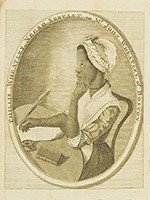 As the 'Mother of Black Literature' you would think that Phillis Wheatley would need no introduction, but her poetry is only recently becoming better known. Surrey History Centre holds a first edition of her work, 'Poems on Various Subjects, Religious and Moral' that was published in 1773, among the papers of the Ware family of Tilford (reference 1487/118/1). The book carries this engraving of Phillis inside the front cover, posed with her pen, a rare artistic depiction of a Black person, especially a woman, at that time.
As the 'Mother of Black Literature' you would think that Phillis Wheatley would need no introduction, but her poetry is only recently becoming better known. Surrey History Centre holds a first edition of her work, 'Poems on Various Subjects, Religious and Moral' that was published in 1773, among the papers of the Ware family of Tilford (reference 1487/118/1). The book carries this engraving of Phillis inside the front cover, posed with her pen, a rare artistic depiction of a Black person, especially a woman, at that time.
Phillis was taken from West Africa when about 8 years old and became enslaved in Boston, Massachusetts. However, her extraordinary talent for writing poetry and support from a wealthy English benefactor propelled her into becoming a living testimony for the abolition movement. Becoming the first published Black American poet helped raise awareness of enslaved people in the late eighteenth century. You can discover Phillis Wheatley's full story in a previous Marvel of the Month from October 2022.
Black nurses in the NHS
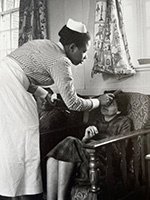 With chronic staffing shortages in British hospitals after the end of the Second World War, health care staff from across the world answered the call for help. The severest shortages were in unpopular areas of nursing such as mental hospitals (former asylums), of which Surrey had many. We hold records of the recruitment of nurses from Tanganyika (now part of Tanzania), Nigeria and the Caribbean in particular. Customs, culture and language, not to mention the weather, all presented a challenge for these brave and resilient young women who left their homes, families and everything familiar, to make a new life in a county where every aspect couldn't have been more different. Julian Pooley, Surrey History Centre's mental hospitals records expert, comments: 'These new members of staff were not just trainees who came and went, they were quickly immersed in the daily, social life of the institution'.
With chronic staffing shortages in British hospitals after the end of the Second World War, health care staff from across the world answered the call for help. The severest shortages were in unpopular areas of nursing such as mental hospitals (former asylums), of which Surrey had many. We hold records of the recruitment of nurses from Tanganyika (now part of Tanzania), Nigeria and the Caribbean in particular. Customs, culture and language, not to mention the weather, all presented a challenge for these brave and resilient young women who left their homes, families and everything familiar, to make a new life in a county where every aspect couldn't have been more different. Julian Pooley, Surrey History Centre's mental hospitals records expert, comments: 'These new members of staff were not just trainees who came and went, they were quickly immersed in the daily, social life of the institution'.
Nursing staff records are closed to public inspection for 75 years so locating and presenting the experiences of these women is challenging. Some students did not complete their training. The Matron kept nurses 'character books' at The Manor Hospital, Epsom (reference 6380/2/4/-) tell of home sickness or having to return home because of family circumstances, as well as women who just couldn't settle into their new life or endure the strictures of student nurse training. Prejudice from the matrons was rife but most triumphed over adversity, contributing a lifetime of dedication and care to their patients and to building our National Health Service, for which we should all be eternally grateful.
Read more about Black healthcare workers in Surrey's mental hospitals (Exploring Surrey's Past).
If you or a family member came to work in Surrey from Africa or the Caribbean, why not record the story for future generations for the archives here at Surrey History Centre, either as a written or oral history memoir? Please contact Surrey History Centre with your story.
A Trinidadian treasure
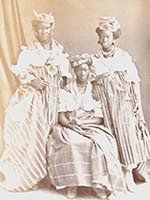 Surrey History Centre holds records for The Queen's Royal Surrey Regiment and its predecessors spanning over 350 years. The regiments served all over the world, mostly involved in imperial campaigns but sometimes in humanitarian efforts. Through battalion diaries, photographs and soldiers' letters, thousands of stories are revealed of the diverse cultures they encountered. This superb image, captioned 'Inhabitants of Trinidad', comes from an album of photographs of the 31st Regiment of Foot (which in 1881 became the 2nd Battalion The East Surrey Regiment). The regiment was garrisoned in Trinidad periodically in the nineteenth century, and we think this photograph (reference ESR/2/13/4 page 75) dates from the 1870s but we know little more about it. We don't know who the women are, but they may be posing for a 'tourist type' photograph, possibly wearing beautiful and extravagant traditional dresses of the type most famously seen now at festival and carnival celebrations on the island. If you can help provide further details, we would very much like to hear from you so please contact Surrey History Centre.
Surrey History Centre holds records for The Queen's Royal Surrey Regiment and its predecessors spanning over 350 years. The regiments served all over the world, mostly involved in imperial campaigns but sometimes in humanitarian efforts. Through battalion diaries, photographs and soldiers' letters, thousands of stories are revealed of the diverse cultures they encountered. This superb image, captioned 'Inhabitants of Trinidad', comes from an album of photographs of the 31st Regiment of Foot (which in 1881 became the 2nd Battalion The East Surrey Regiment). The regiment was garrisoned in Trinidad periodically in the nineteenth century, and we think this photograph (reference ESR/2/13/4 page 75) dates from the 1870s but we know little more about it. We don't know who the women are, but they may be posing for a 'tourist type' photograph, possibly wearing beautiful and extravagant traditional dresses of the type most famously seen now at festival and carnival celebrations on the island. If you can help provide further details, we would very much like to hear from you so please contact Surrey History Centre.
Images
- Black History Month 2023 image
- Illustration of Ellen Craft from the Craft's book Running a Thousand Miles for Freedom, London, 1860 (courtesy of James E Shepard Memorial Library, North Carolina Central University)
- Engraving of Phillis Wheatley 1773 (reference 1487/118/1) from 'Poems on Various Subjects, Religious and Moral'.
- At Netherne Hospital a Black nurse brushes her patient's hair, circa 1955 (reference 6367/12/1/803)
- 'Inhabitants of Trinidad', circa 1870s (reference ESR/2/13/4 page 75)

